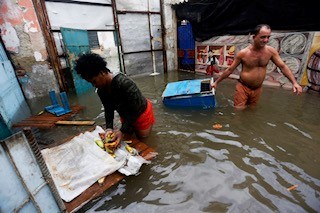
HAVANA TIMES – The high probability of a hurricane hitting Cuba during the next cyclone season underscores the vulnerabilities and risks to the citizens, homes, and agriculture, as well as the necessary mitigation actions in a very unfavorable economic context.
“If a lot of buildings collapse with heavy rain, imagine what would happen if a hurricane hits. It would be a tragedy. When it rains here, the walls leak, and I fear the roof might collapse,” confessed Floraida Matos, a retired accountant living in an old building in Havana, in an interview with IPS.
One of the main vulnerabilities of this Caribbean island nation to heavy rainfall, tornadoes, and tropical cyclones lies in its housing stock, with one-third of the four million homes in fair or poor technical condition.
In Cuba’s cities, including Havana with its 2.2 million inhabitants, collapses of century-old buildings without repairs or rehabilitation work for decades are common after heavy rains.

Low-lying areas in Havana and other towns are also flooded after heavy rains or coastal flooding due to storm surges.
Many of the island’s cities urgently need investments in new sewage lines and drainage channels because “many are clogged due to improper road repairs, only sporadic cleaning of drains, or accumulated garbage and debris in the streets,” engineer Alexis Núñez told IPS.
Living in a low-lying area in Havana, Nuñez recalled that part of the drainage systems in the Cuban capital “are over 100 years old and collapse during heavy rains.”
The loss of crops and animals after the impact of a high-intensity hurricane would also pose a significant vulnerability for this Caribbean Island nation, which imports 70% to 80% of the food it consumes annually.
Amid a deep economic crisis, the island’s government faces difficulties importing food, fuel, and other supplies due to foreign currency shortages, obstacles to accessing credit due to the US embargo, and rising prices on the international market.
For Idania Reyes, a self-employed worker in Havana, the current inflationary context and marked depreciation of wages and pensions “make it difficult to buy non-perishable food” such as canned meat, eggs, cookies, jellies, and sweets.
Reyes told IPS that these foods are available in private shops and state-owned hard currency stores, “but they are very expensive, and not everyone, due to their low income, can buy enough to get through the cyclone and the following days without electricity.”
A minimum pension on the island is equivalent to about four dollars a month, and the a


